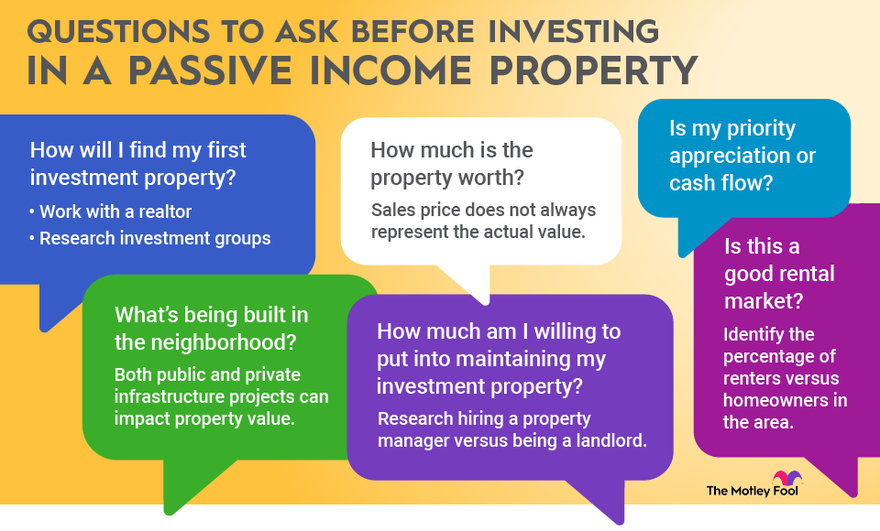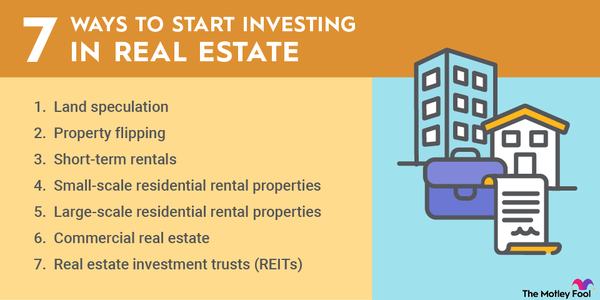There are many ways to make passive income from real estate. They range from low-cost, truly passive investments to more hands-on methods of generating income from real estate investments. With so many ways to collect passive income from the real estate sector, there are options for any budget and time commitment.

We'll explore what it means to make passive income from real estate investments and highlight how you can turn real estate into a money maker. We'll also consider some of the mistakes to avoid that can impact your ability to earn passive real estate income.
What is real estate passive income?
What is real estate passive income?
The IRS defines passive income as regular earnings from either:
- A trade or business activity you don't materially participate in during the year, such as dividend income or royalties from a book.
- Rental activities, even if you do materially participate, unless you're a real estate professional.
Passive income from real estate includes any income generated from rental activities and other real estate investments. Real estate passive income often requires an up-front investment that generates recurring income. Some passive real estate investing demands more hands-on management, while others are truly passive.
Passive income ideas
Ten ways to make passive income from real estate
Here's a brief look at some of the many ways to make passive income from real estate:
1. Publicly traded real estate investment trusts (REITs)
Real estate investment trusts (REITs) that trade publicly on stock market exchanges are traditionally the easiest and lowest-cost way to invest in real estate to collect passive income. REITs must distribute 90% of their taxable net income to shareholders via dividends to maintain their tax-advantaged status with the IRS. That makes them a great source of income.
REITs are also a low-cost investment since shares of most REITs trade for less than $100 each. They’re passive investments because you don't need to do any work other than research and follow the investment. Public REITs are also highly liquid because you can buy and sell shares through a brokerage account any day the stock market is open.
There are more than 200 publicly traded REITs. Many focus on specific property sectors, such as industrial, office, retail, or residential, or they focus on certain markets, such as the Sun Belt region or the West Coast. That provides investors with lots of passive income investment options.
There are some downsides to publicly traded REITs, including exposure to stock market volatility. While there are many REIT options, it can be daunting for beginning investors to know which ones to buy. Finally, a poorly managed REIT can find itself in financial trouble during a recession, which would cause the REIT to reduce or even temporarily pause its dividend while it works through the issues.
2. REIT exchange-traded funds (ETFs)
A great way for beginners to start generating passive income from real estate is through REIT ETFs. They hold a broad basket of REITs, which reduces the risk of losing income if a single investment cuts its dividend due to deteriorating market conditions.
REIT ETFs are relatively low cost since you only have to buy one share. They trade on the stock market, making them highly liquid. ETFs are one of the most passive ways to invest in real estate. However, like public REITs, they expose the holder to stock market volatility. ETFs also charge investors a fee, known as the ETF expense ratio.
3. REIT mutual funds
REIT mutual funds are a lot like REIT ETFs. They hold a basket of REITs, enabling investors to gain broad exposure to the sector. A manager actively manages the mutual fund, aiming to buy shares of the REITs they believe will deliver superior performance relative to a benchmark index.
Because of that active management, REIT mutual funds often have a higher expense ratio than REIT ETFs. They also tend to have a higher minimum investment, typically around $2,500. Usually you’ll need to purchase a REIT mutual fund through a broker.
4. Non-traded REITs
Non-traded REITs don't trade on stock exchanges. Instead, investors purchase shares through a direct-to-consumer online portal such as Fundrise or Realty Mogul or through a financial advisor. Private real estate investments have historically offered a higher income yield than publicly traded REITs, and they’re also less volatile.
However, many private REITs have a higher minimum investment ($2,500 or more) and require a relationship with a financial advisor. Non-traded REITs are relatively illiquid investments, meaning you can't easily buy or sell shares. Many non-traded REIT sponsors only redeem shares once a quarter and set a limit on the amount of redemptions they'll complete.
5. Real estate syndications
Real estate syndications enable passive investments in commercial real estate. They allow an investor to become a limited partner in a single real estate asset (such as a multifamily property, office building, or self-storage facility) or a private equity real estate fund managed by a real estate sponsor.
The partners get to share in the passive income generated by the property or fund. Private real estate investments tend to offer a higher income yield than publicly traded REITs and aren't as volatile. Investors can participate in single real estate syndications and funds through online portals, e.g., CrowdStreet and EquityMultiple, or directly with real estate deal sponsors.
However, most real estate syndications are only open to accredited investors. An accredited investor must have a net worth of $1 million, excluding their primary home, or more than $200,000 of income ($300,000 if married).
Further, they often have a minimum investment of more than $10,000. Syndication deals are also illiquid investments, often requiring long-term holding periods of five to 10 years.
6. Debt and debt-like investments backed by real estate
Real estate-backed debt can be another way to generate passive income from real estate. You're lending money to finance the purchase, renovation, redevelopment, or ground-up construction of a property. There are many options, including:
- Buying mortgage notes.
- Being a hard money lender for a house flip or a development project.
- Investing in mezzanine debt or preferred equity on a single asset syndication deal.
Real estate debt tends to be a lower-risk investment. However, because it’s a fixed-income investment, it doesn't offer any capital appreciation potential.
7. House hacking
House hacking is a way to generate income from your current home. There are many forms of house hacking, including buying a duplex or fourplex and living in one unit while renting out the others, renting a room in your home to a family member or college student, or converting a garage or basement into a small rental unit. House hacking provides rental income to help offset part or all of your living expenses.
However, it's not entirely passive income. For example, you might need to fix something a renter broke, and it can be an invasion of privacy. House hacking can require a large up-front cost to purchase the investment property or make a space for renters, and it has some additional tax implications.
8. Short-term vacation rentals
Short-term vacation rentals are an increasingly popular way to generate passive real estate income. You buy a home or condo in a vacation destination and rent it out to leisure travelers. Web portals such as Airbnb (ABNB 1.98%) make listing a property and finding renters easy. Short-term rentals tend to command higher rental rates than long-term rentals, making them a potentially lucrative source of income. As a bonus, you can use your vacation rental when it's vacant.
However, short-term rentals aren't exactly passive since there's lots of work involved in managing a rental. A vacation rental is more like a hospitality business than a real estate investment. You can hire a property manager to turn it into a passive investment, but they charge a significant portion of the rental income in fees.
Short-term rental properties have a high up-front cost. You'll typically need a 20% down payment, plus closing costs and some cash in reserve for vacancies and repairs. Vacation rentals also experience high vacancy rates, especially in off-peak times and during a recession, making the passive income rather lumpy.
9. Rental properties
Owning rental properties is another way to generate passive real estate income. Many people own condos or single-family homes that they rent to long-term tenants (12 months or more) to generate relatively steady rental income.
However, rental properties aren't entirely passive investments. You might get a 2 a.m. call to fix a broken toilet unless you hire a property manager. Further, the income can fluctuate from month to month depending on expenses, and you might not generate any passive income if there are a lot of unplanned costs. Finally, rental properties often require a significant up-front investment similar to short-term vacation rentals.
10. Ground leases
Ground leases enable you to generate passive income from owning land instead of a building. You own the land underneath a building that you lease to the building's owner. A ground lease generates predictable passive lease income and tends to be a very low-risk investment. Ground leases offer less income potential in exchange for the lower risk profile. They also have a relatively high up-front cost to purchase the land.
Related investing topics
Mistakes to avoid
Passive income investing mistakes to avoid
While real estate can be a great way to generate passive income, there are some pitfalls to avoid. These include:
- Not doing enough due diligence to understand the risks involved with a real estate investment.
- Taking on too much debt to purchase a real estate investment that you can't service if the income declines.
- Failing to account for the potential expenses to maintain a real estate investment.
- Not being comfortable with the volatility of stock prices or rental income.
- Not properly screening tenants.
- Choosing a real estate investment that involves more active management than you can give.
- Not diversifying your real estate portfolio beyond one investment -- unless it's an already-diversified investment such as an ETF or mutual fund.
The bottom line
Real estate investing is a great way to generate passive income. It offers a variety of options, enabling anyone to get started making passive income from the sector. While there are risks involved with passive income real estate, investors can reduce their risk by avoiding common mistakes.
FAQs
Real Estate Passive Income FAQs
When should you buy passive income real estate?
Real estate isn't a short-term investment. As long as you take a long-term investment approach, it's usually a good time to buy passive income real estate since the focus is on properties that generate income instead of capital appreciation. However, the best time to buy real estate is during the early stages of an economic recovery following a recession because prices are lower. Conversely, real estate boom times are not the best for buying since you'll often pay a higher price.
Where should you buy passive income real estate?
Location is one of the keys to successful real estate investing. You'll want to focus on buying properties in growing markets because that should drive continued demand for rental properties, helping to keep the property occupied and the rental rate rising.
How do you find passive real estate to purchase?
There are many sources of passive real estate investments, including the stock market, financial advisors, direct-to-consumer online portals (sometimes known as real estate crowdfunding sites), other real estate investors, real estate private equity firms, developers, and real estate agents. You can also solicit real estate investment opportunities through paid advertisements or by letting your social media followers know you're looking for an investment opportunity.



















